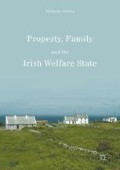Abstract
Between 1948 and 1968, the system of socialised homeownership which had emerged between the 1920s and 1940s and initially focused on rural dwellers was expanded to include urban areas and the process of land redistribution also increased from the lows seen during the wartime period. This was the “saturation” period in the development of Ireland’s property-based welfare system, when demand for asset redistribution was almost completely satisfied or at least the limits of the distribution possible were reached but, concurrent with the peak of its development, the first signs of weakness in this welfare model also became evident. The latter was evidenced by growing criticism of this model by politicians, rather than any radical redirection in policy. The end of hegemonic support for property-based welfare reflected the weakening of the legitimacy and efficiency bulwarks which supported these policies as a result of a wider crisis within Ireland’s socio-economic model and pressures on associated public expenditure. However, during the 1950s and 1960s, the power of farmers and the building industry proved sufficient to ensure the continued expansion of the property-based welfare system. This chapter describes this expansion, the drivers of this development and the tentative signals of the weakening of these drivers which also emerged between 1948 and 1968.
Access this chapter
Tax calculation will be finalised at checkout
Purchases are for personal use only
References
Angel, S. (2000). Housing policy matters: A global analysis, Oxford: Oxford University Press.
Barry, F. (2000). Convergence is not automatic: Lessons from Ireland for central and eastern Europe. The World Economy, 23(10), 1379–1394.
Barry, F. (2009). Politics and fiscal policy under Lemass: A theoretical appraisal. Economic and Social Review, 40(1), 393–406.
Beveridge, W. (1942). Social security and allied services. London: HMSO.
Blackwell, J. (1988). A review of housing policy. Dublin: National Economic and Social Council.
Bradley, J. (2004). Changing the rules: How the failures of the 1950s forced a transition in economic policy making. Administration, 52(1), 92–107.
Carey, E. (1974). Building societies in Ireland. Dublin: Stationery Office.
Carey, S. (2007). Social security in Ireland, 1939–1952: The limits to solidarity. Dublin: Irish Academic Press.
Central Statistics Office (various years). Census of population of Ireland. Dublin: Stationery Office.
Daly, M. (1997). The buffer state: The historical origins of the Department of the Environment. Dublin: Institute of Public Administration.
Daly, M. (2006). The slow failure: Population decline and independent Ireland, 1922–1973. London: University of Wisconsin Press.
Department of Finance (1958a). Economic development. Dublin: Department of Finance.
Department of Finance (1958b). First programme for economic expansion. Dublin: Department of Finance.
Department of Local Government (various years). Tuarascáil/Report. Dublin, Department of Local Government.
Dooley, T. (2004a). Land and politics in independent Ireland, 1923–48: The case for reappraisal. Irish Historical Studies, 34(134), 175–195.
Dooley, T. (2004b). The land for the people: The land question in independent Ireland. Dublin: UCD Press.
Dowling, B. (1974). The development of the financial sector in Ireland, 1949–72”. Journal of the Social and Statistical Inquiry Society of Ireland, XXIII(I), 57–107.
Fanning, R. (1978). The Irish Department of Finance, 1922–58. Dublin: Institute of Public Administration.
Gallagher, M. (1982). The Irish Labour Party in transition: 1957–82. Manchester: Manchester University Press.
Garvin, T. (1981). The evolution of nationalist politics. Dublin: Gill and McMillan.
Girvin, B. (1989). Between two worlds: Politics and economy in independent Ireland. Dublin: Gill and Macmillan.
Glennerster, H. (1995). British social policy since 1945. Oxford: Blackwell.
Hayden, A. (2013). Tenant purchase in Ireland: A study of path dependency. Dublin: unpublished PhD thesis submitted to University College Dublin.
Holmans, A. (2005). Historical statistics of housing in Britain. Cambridge: Department of Land Economy, University of Cambridge.
Jones, D.S. (2001). Divisions within the Irish Government over Land Distribution Policy, 1940–70. Eire-Ireland, 36(3–4), 87–92.
Lee, J. (1989). Ireland, 1912–1985: Politics and society. Cambridge: Cambridge University Press.
McCashin, T. (2004). Social security in Ireland. Dublin: Gill and Macmillan.
Minister for Local Government (1948). A review of past operations and immediate requirements, housing white paper. Dublin: Stationery Office.
Minister for Local Government (1964). Housing progress and prospects. Dublin: Stationery Office.
Monahan, P. (1947). Housing. Christus Rex, 3(3), 46–62.
Murphy, G. (1997). Towards a corporate state? Sean Lemass and the realignment of interest groups in the policy process 1948–1964. Administration, 47(1), 86–102.
National Economic and Social Council (1977). Report on housing subsidies. Dublin: NESC.
O’Brien, J. (1953).The vanishing Irish: The enigma of the modern world. New York: McGraw-Hill.
O’Connell, C. (2007). The state and housing in Ireland: Ideology, policy and practice. London: Nova Science.
O’Connor, E. (2011). A labour history of Ireland 1824–2000. Dublin: UCD Press.
O’Connell C. (2004). The housing market and owner occupation in Ireland. In: M. Norris, & D. Redmond (Eds.), Housing contemporary Ireland: Policy, society and shelter (pp. 21–44). Dublin: Institute of Public Administration.
Powell, F. (1992). The politics of Irish Social Policy 1600–1990. New York: Edwin Mellen Press.
Roche, W. (2009). Social partnership: From Lemass to Cowen. Economic and Social Review, 40(2), 183–205.
Rothman, D. & O’Connell, P. (2003). The changing social structure. In B. Fanning, & T. McNamara (Eds.), Ireland develops: Administration and social policy, 1953–2003 (pp. 68–88). Dublin: Institute of Public Administration.
Threshold (1981). Private rented: The forgotten sector. Dublin: Threshold.
Tomka, B. (2013). A social history of twentieth-century Europe. London: Routledge.
United Nations (1958). Financing of housing in Europe. Geneva: UN.
Whitaker, T.K. (1956). Capital formation, saving and economic progress. Journal of the Statistical and Social Inquiry Society of Ireland, XVIX(1955/1956), 184–209.
Author information
Authors and Affiliations
Rights and permissions
Copyright information
© 2016 The Author(s)
About this chapter
Cite this chapter
Norris, M. (2016). Saturation: 1948–1968. In: Property, Family and the Irish Welfare State. Palgrave Macmillan, Cham. https://doi.org/10.1007/978-3-319-44567-0_4
Download citation
DOI: https://doi.org/10.1007/978-3-319-44567-0_4
Published:
Publisher Name: Palgrave Macmillan, Cham
Print ISBN: 978-3-319-44566-3
Online ISBN: 978-3-319-44567-0
eBook Packages: Social SciencesSocial Sciences (R0)

